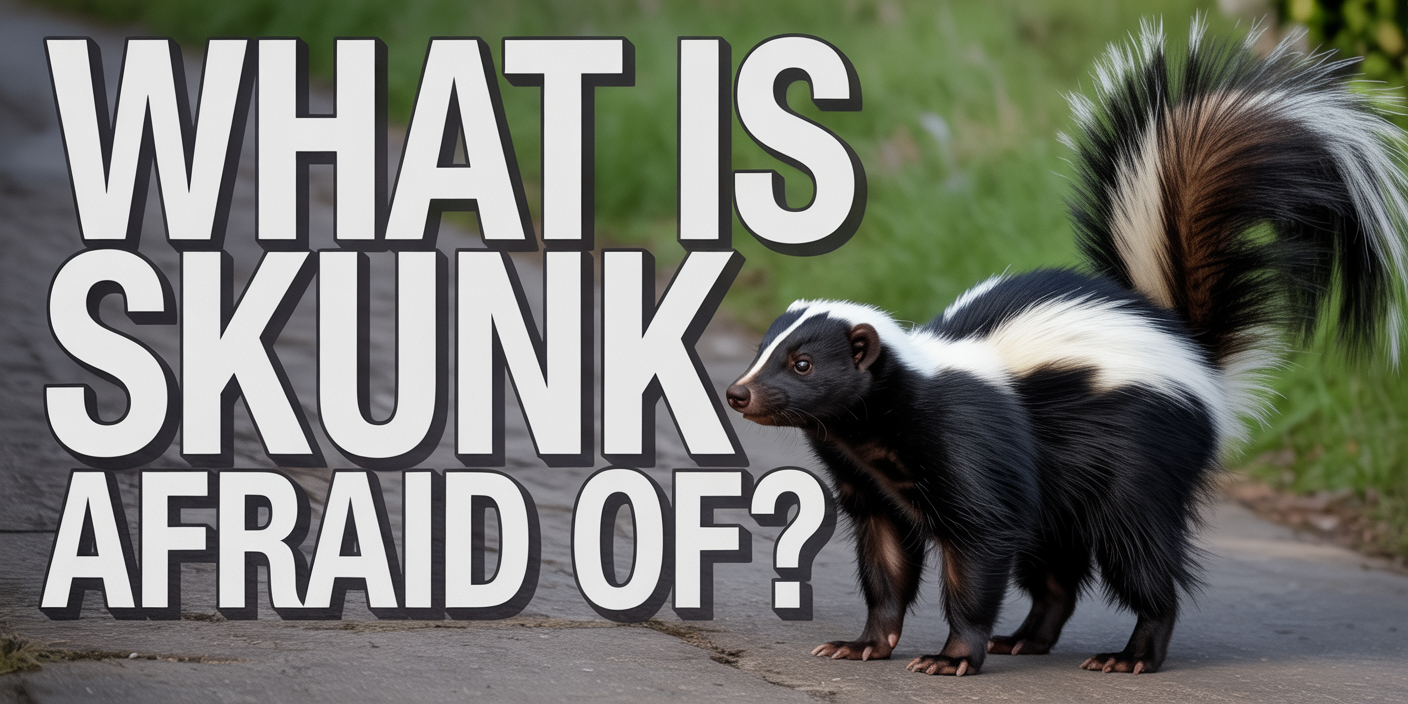Skunks avoid loud noises, sudden movements, bright lights, and predator scents. These triggers make them feel unsafe and are often enough to scare them away from your property.
Skunks are shy, nocturnal animals that usually prefer to avoid confrontation, but when they show up near your home, they bring a strong-smelling problem with them. If you’re trying to keep one from turning your yard into its personal hangout, it helps to know exactly what scares them off.
What Is a Skunk Afraid Of?
Skunks are naturally afraid of anything that disrupts their sense of safety. Loud noises, fast movements, bright lights, and the presence of predators can all trigger their instinct to flee instead of spray.
Common fear triggers include dogs barking, motion-activated sprinklers, strobe lights, or the scent of larger animals like coyotes or foxes. These tools work because skunks prefer quiet, dark, and predictable environments, when that’s disrupted, they usually move on.
Learn more: What time of night do skunks come out?
Natural Predators That Skunks Avoid
In the wild, skunks have a few natural enemies that they instinctively try to avoid. Predators like coyotes, bobcats, foxes, owls, and large hawks all pose a serious threat, even with the skunk’s smelly defense system.
The sound, scent, or even decoys of these predators can make an area feel unsafe for a skunk. Some homeowners use predator urine (like fox or coyote) sold at garden stores to create that same instinctual fear response and convince skunks to stay away.
Scents That Repel Skunks
Skunks have a strong sense of smell, which makes them highly sensitive to certain odors they find offensive or dangerous. Strong scents like citrus peels, ammonia, vinegar, and predator urine are known to overwhelm or irritate them enough to stay away.
To use scent deterrents effectively, place soaked rags, cotton balls, or spray mixtures near skunk entry points; under porches, sheds, or along fences. Just keep in mind that rain and wind can weaken these smells, so reapplication every few days is key to keeping the barrier strong.
Do Lights and Sounds Scare Skunks Away?
Yes, sudden lights and unexpected sounds can spook skunks and make them think twice about sticking around. Motion-activated floodlights or blinking strobe lights break the darkness they prefer and create an unpredictable environment they don’t like.
Sound deterrents like ultrasonic devices, radios, or even wind chimes can also disrupt their sense of safety. These work best when placed near common entry points or potential dens, especially if combined with other scare tactics for a layered defense.
Human Activity and Household Pets
Skunks are naturally wary of people, and regular human activity is usually enough to keep them from settling too close. Yard work, outdoor conversations, or frequent movement in and out of the house signals that the area isn’t quiet or safe for nesting.
Dogs, in particular, are a strong deterrent for skunks. The scent, bark, or even presence of a dog in the yard can be enough to make a skunk look elsewhere for shelter. Just be cautious, if your dog surprises a skunk, it might come home needing a serious bath.
What NOT to Do When Trying to Scare Off a Skunk?
Never try to chase, corner, or physically confront a skunk, it’s a surefire way to get sprayed. When a skunk feels threatened or trapped, its natural defense is to spray first and escape later, so keeping your distance is key.
Also avoid using toxic repellents or harsh chemicals like bleach or poison. These can harm pets, damage soil, and may even be illegal in some areas. Stick to humane, non-toxic methods that disrupt the skunk’s comfort without putting your household or local wildlife at risk.
Making Skunks Think Twice About Staying
Skunks are timid by nature and will avoid anything that feels loud, bright, threatening, or unfamiliar. By using scents they dislike, motion lights, or signs of predators, you can send a clear message that your property isn’t a safe place to hang around.
Still, some skunks don’t scare easily, especially if they’ve already settled in. When that happens, the smartest move is to call in experts who know how to handle them without the stink or the stress.
When to Call Wildlife Control Experts?
If a skunk has built a den under your porch, shed, or deck and doesn’t respond to deterrents, it’s time to bring in professionals. Trying to remove a nesting skunk on your own can lead to sprays, bites, or property damage, especially if there are babies involved.
Wildlife removal experts, like the team at AAAC Wildlife Removal, know how to handle skunk control safely and humanely. They’ll assess the situation, remove the animal without harm, and secure the area to prevent another visit. It’s the safest and most effective way to get lasting results.




